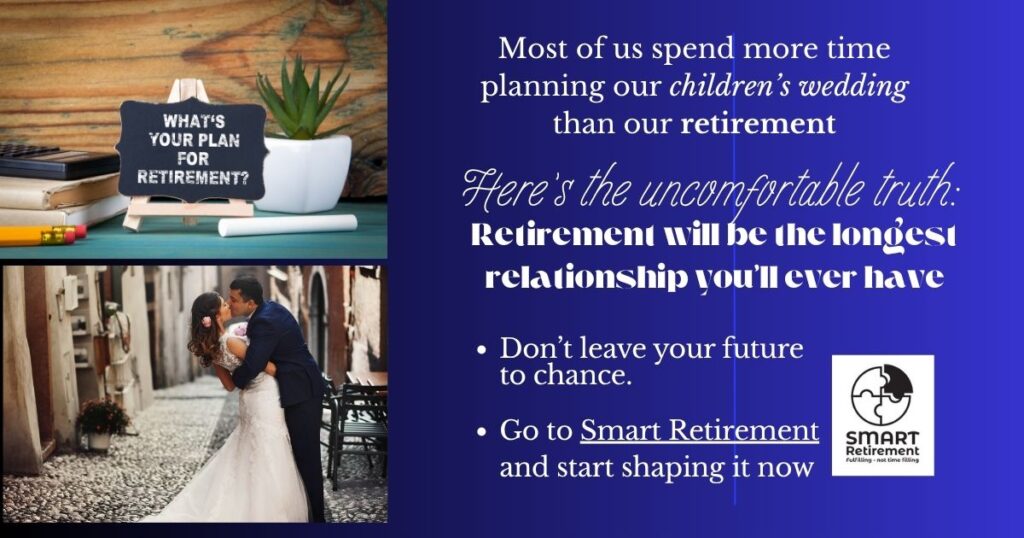
Most of us spend more time planning our children’s wedding than our retirement.
Perhaps no other stage of life triggers such intense feelings of excitement and liberation, on the one hand, but on the other, fear and anxiety. For many, retirement entails a leap of faith after decades of routine. You’re not simply at work Friday, doing your job, and retired Monday, dancing for joy, though. Retirement is a major transition that unfolds over many years, as we move from the life we know into the life we will get to know.
Many pre-retirees do not fully comprehend how dramatically their lives will change.
‘I struggled with it.’ A university teacher of more than two decades says of retiring. ‘It wasn’t what I expected.’ Nancy Schlossberg is an expert on transitions and how to navigate them, and the author of ‘Too young to be old: Learn, Work and Play as you Age’.
A few lucky souls know exactly what their retirement will look like. The rest of us figure it out as we go. If we go, that is. Many people are simply not psychologically ready to retire, even if they are financially able. Their job is their identity, and without their job they don’t know who they are.
Research shows adjusting to retirement is difficult for such people, who report more boredom, anxiety, restlessness and feelings of uselessness. Retired men, for example, were found to be 40% more likely than employed men to experience depression. According to the Centres for Disease Control and Prevention, the greatest increase in suicide rates between 2000 and 2016 occurred among 45 -64-year-old men.
‘People spend more time planning a wedding than planning retirement’, says renowned sociologist Phyllis Moen.
It is very important to think about your identity and what you’re losing and how to get a new identity. What would give you a sense of meaning and purpose?
There is no one-size-fits-all solution, but there are ways to carry the relevance of your work life into retirement. Constructing a framework for your retirement should start at least 3 – 5 years before the planned date. Assessment and course correction occur about a year before. A year or so after retirement, the honeymoon period will likely have waned; it’s time to review how things are going. Give yourself another couple of years for retired life to become your new normal. That’s a six-to-eight-year journey that will require flexibility and resilience.
Gerontologist Ken Dychtwald has identified five phases of retirement:
Imagination: (15-5 years before retirement)
Anticipation: (5 years before retirement)
Liberation: (first year of retirement)
Reorientation: (2-15 years post retirement)
Reconciliation: (> 15 years post retirement)
‘People decide to retire based on an economic state rather than a life state,’ says retirement coach Mitch Anthony. ‘Retirement is a mental-health consideration, we’ve treated it as if it’s something you have to do; then, Do you have enough money? – conversation over ‘
In this anticipation stage, ask yourself how you’ll spend time in retirement, which could span 25 years or longer. What activities, interests and lifestyle would be compatible?
One way to answer that question is to think about retirement not as the end of work but as the start of a late-career transition. ‘Identifying goals in retirement and having perseverance in pursuing them leads to better retirement.’ Says Karl Pillemer, a professor of Human Development at Cornell University.
One year to retirement is the time to really question whether you’re ready. Emeritus Professor of Psychology – Norman Abeles suggests asking yourself several questions – ‘What am I going to do the week after I retire? How about six months after that? Talk to your partner – what are the two of you going to do together? After you visit the grandchildren and have done the travelling, what are you going to do day by day?’
One helpful preparation tool is the ‘How to be happy and fulfilled in retirement Mastery Course’, which will guide you through the various steps to transition from work to life after work. At the end of the course, you will have developed your personal roadmap for freedom.
Three years post-retirement, and the honeymoon is over. It’s been over for a while, in fact. By now, ideally, you’re a year or so into the reorientation stage of retirement. You’ve taken twists and turns, and finally you’re settling in.
‘The most important thing people need is to reframe their mindset in terms of what they have to offer the world , and their perspective on aging’ is the comment of Chip Conley, boutique hotel chain owner, author and now strategic adviser to Airbnb.
Conley views retirement as a time to reinvent yourself and pursue what you’ve always wanted but never dared to chase. Increasingly, older people are doing just that.
As the reorientation stage unfolds over a decade or two, people begin to pay attention to their legacy, ushering in the reconciliation stage. Your legacy is not the material wealth you leave in a will; it’s how you will be remembered. This is the opportunity of a lifetime – the chance to distribute the wealth of knowledge, depth and wisdom you’ve acquired just by being alive.
The storyline of retirement will be less about winding things up and more about transforming oneself.
Rather than just becoming elderly, we become elders; wise, well-travelled through life, and deeply experienced


Comments are closed.